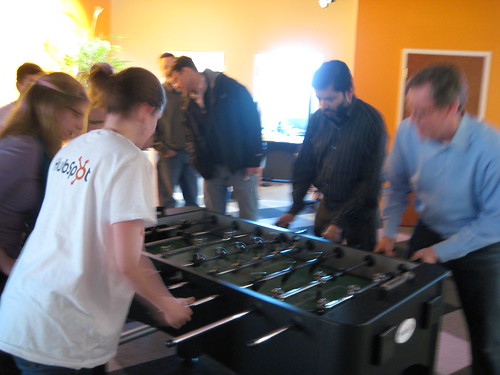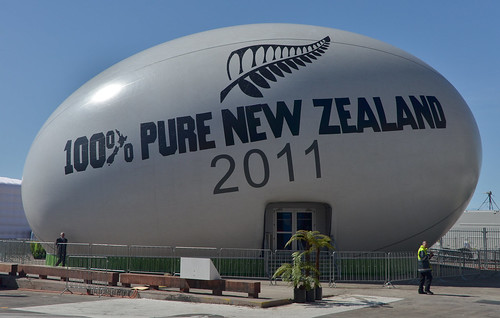Sydney Poetry
A social site for poets in Sydney.
The misappropriation of "football"
Ed: A ball calling for a very big foot.
Now, while the Rugby World Cup is dominating the world’s sporting news, we must use the opportunity to wrest back the word football from our soccer rivals. Soccer (Association Football) came into existence at least a generation after rugby football. At that time there were many forms of football around in England and around the world. The followers of Association Football have been trying to misappropriate the word football for many years with no basis in history.
The world game
 Football is a sport as old as history. There are forms of football in many cultures around the world that involve carrying the ball. The Māori in New Zealand played a ball game called Ki-o-rahi on a circular field throwing and kicking a ball called a ki. The Australian Aboriginals had a kicking and catching game, Marn grook, which in some places used a ball made from possum skins.
Football is a sport as old as history. There are forms of football in many cultures around the world that involve carrying the ball. The Māori in New Zealand played a ball game called Ki-o-rahi on a circular field throwing and kicking a ball called a ki. The Australian Aboriginals had a kicking and catching game, Marn grook, which in some places used a ball made from possum skins.
In Manipur, India, they play Yubi lakpi (meaning literally coconut snatching), a football game using a coconut, very similar to rugby.
In Europe the Romans played a ball game called Harpustum (from the Greek, harpazein, meaning to snatch) described as involving many wrestling holds. They took it all over their empire. The Georgians have Lelo burti (meaning literally field ball), a full contact ball game.
A game played on foot
A large misconception about football is that the word originated as a ball game that involved exclusively kicking the ball with your foot. Football got its name because it was a game played on foot as opposed to on horseback (there was a game called horseball that originated in 1700). This had an important class distinction in that the aristocratic sports were equestrian and the peasants played on foot. It may also have been a name used to differentiate forms of football from handball in medieval times.
Shrovetide footballs
Early English football games were played between neighbouring villages and involved an unlimited number of players on opposing teams (men, women and children), who would compete to carry a ball made from anything including inflated pig bladders to the objective (hence the goal).
These games are referred to as folk football, mob football or Shrovetide football (Shrovetide being the week before Lent). In the many royal proclamations that came out to ban them they were referred to as Fute Ball despite some of these games strictly forbidding kicking the ball.
There were many forms: the Irish had Caid (meaning scrotum of the bull, lets hope this was not a literal name); the Welsh had Knapan (Cnapan, Knappan); the Cornish had hurling to goal; the West Country of England (Devon, Gloucestershire, etc) had hurling over country; the East Anglians had Camp Ball; and the Scots the Ba Game.
The Shrovetide football game at Ashbourne in Derbyshire between the people from each side of Henmore Brook (the Up’Ards and the Down’Ards) is the origin of the term “local derby” for an intense sporting match between neighbouring teams.
The French had a similar version called la Soule or la Chole also played mainly on Shrovetide. Florence, in Italy, had a version they played in a piazza that they called giuoco del calcio fiorentino (the Florentine kick game) or simply calcio (kick). All these games involved throwing and kicking as well as a lot of body contact.
Killing the ball
The Vikings played a game called Knattleikr. In Iceland it was played on frozen lakes. According to Icelandic sagas the ball was hard enough that when thrown in anger at another player it could cause bloodshed.
Some of the English games were referred to as kicking the Dane’s head. While not suggesting a bloody ritual it might link the game to the Vikings and be a bit of folk revenge. In some forms of folk football once the ball got to the goal it was symbolically killed and the game was over—hence the modern sporting expressions dead ball and killing the ball.
Running rugby

Another misconception about the origins of football comes from the myth of William Webb Ellis. During a football game at Rugby School, he picked up the ball and ran with it to produce the game of rugby. But the revolution was not so much picking up the ball but running with it. They were not playing soccer because it had not been “invented” at that time in the 1820s. They were playing a school form of football that involved catching and throwing.
By the way, the game of rugby gets its name from Rugby, a large town in Warwickshire, in the west of England. The town got its name from the Anglo-Saxon Hrōca burh, or later Norman French, Rocheberie, meaning Rook Fort, from the bird’s name. Later the burh, for fort, was replaced, perhaps under the influence of Danish settlers, with -by, meaning village, to become Rugby.
Rugby Football rules
Organised games developed in English private boys schools during the 19th century when cheap rail travel meant inter-school matches became feasible. The schools all played football games with diverse and always changing rules but needed to agree on sets of rules when they played each other. Rugby School created the first set of such football rules in 1845.
Soccer
It took another 18 years before Association Football codified their rules, in 1863. This form of the game was called soccer, an abbreviation of Association Football (ie …ssoca…), and was a parallel formation to rugger, a common name of rugby at the time. Association Football did not allow all the players to pick up the ball, the lucky exception being the goalkeeper.
Aussie Rules
In Melbourne, in the 1860s, the Australians developed their own set of rules, Aussie Rules which was designed as a game to keep cricketers fit during the winter and hence is played on the oval field equivalent to a cricket oval.
All football rules
The first official Rugby Football Union rules were adopted in 1871 for the adult game. American Football developed its distinct rules in 1880; Gaelic Football published their rules in 1887; Rugby League broke away from Rugby Union in 1895 and developed a few rule changes. Before the distinction between amateurs and professionals it was common for football teams from different places to play under different rules as agreed with their opposition.
Using the word football
In Australia where there is great competition between football codes, we talk about football when we know who we are talking to: whether it be rugby league, rugby union or Aussie rules supporters. Soccer is still soccer.
Association Football is claiming to call itself football as a distinction from the other forms of football that use their hands. Don't be fooled as history tells another story.

Ed: Foosball – yet another misappropriation.
-
Comment by Raymond H Wittenberg on September 14, 2011 at 14:40
-
about aussie rules football it seems reasonable to assume that mob football was played without rythm or reason as young men are wont to do on the Victorian goldfields. This native exurberence found structure in the private schools of Melbourne in the late 1850's with the return of Tom Wills who had sat at the tables of the Football Associations in England, bringing some of those rules to bare in Victoria. As a Dutch Australian and a keen follower of the Oranje team during the last World Cup final I'm delighted to have played Australian Rules as a youngster and happy to share the word football with all the codes. I was saddened to learn that Tom Wills committed suicide in the 1870's, if only he could have imagined how the game he fostered would develop into the spectacle it is today.
-
Comment by Tim Entwisle on September 14, 2011 at 15:55
-
Raymond, Thanks for that. It is interesting to reiterate that all the football codes shared some common rules and a common desire to codify them which even travelled to Australia. But the idea of mob football in a giant free-for-all with few rules does have some appeal. Regards Tim
-
Comment by Raymond H Wittenberg on September 15, 2011 at 16:02
-
Tim, yes that's possible when everyone is in it for the fun nad there's no question that sport is fun if not art, in a ritualistic sense anyway, because we love to let off excess energy with what ever fantasy bounces our way. What was unusual in England at a time when young men were desperate for fun instead of those frightful war games the king and all those chaps would play was the land clearances which restricted everyone's sense of place and then the industrial revolution which insisted that everything and everyone become regimented as at war with life itself. It's fairly easy to see how the idea of mob football nearly perished in that land except that certainn brighter souls thought to regiment those games as well which in the end gave us all this terrific variety. My theory extends to landscape again and soccer could only have come from the heart of the industrial revolution as a factory model that has not been bettered. It fits neatly into the industrial landscape. Happily the other codes are derived from landscapes of their own so we all identity with landscape in the end. There's no getting away from our organic selves and the need to play in our chosen landscape. Cheers Tim
-
Comment by Tim Entwisle on September 15, 2011 at 17:17
-
Yes and now we have paintball!
-
Comment by Raymond H Wittenberg on September 19, 2011 at 11:07
-
I prefer a paint brush
Add a Comment
On Facebook
@sydneypoetry
© 2024 Created by Adrian Wiggins.
Powered by
![]()

You need to be a member of Sydney Poetry to add comments!
Join Sydney Poetry